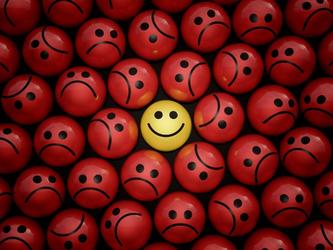The pursuit of happiness: Can you quantify what makes us happy?
Can money make you happy? For some, the answer is an obvious no, while others, perhaps, put more emphasis on material rewards.
The research team behind a recent smartphone app, The Happiness Project, set out to explore the circumstances in which humans are happy or unhappy. Bastien Blain, research associate at University College London’s Queen Square Institute of Neurology, who worked on the project, says that the recent focus has been on the impact of learning and reward on happiness.
An initial lab experiment carried out by Blain and his colleagues saw volunteers play a game in which they decided which of two cars would win in a race. In the ‘stable’ condition, one of the cars always had an 80% chance of winning. In the so-called ‘volatile’ condition, one car had an 80% chance of winning for the first 20 trials, switching to the other car for the next 20. The volunteers were not told these probabilities before the experiment began, but had to work them out by playing the game.
Before the race started, the participants were shown the potential reward they would receive for their car winning. The size of the reward fluctuated at random between trials and was unrelated to the chances of a car actually finishing the race victorious.
In between trials, volunteers were asked to rate their current level of happiness. The results showed that participants, particularly those who exhibited symptoms of depression, were happier in the stable condition and after they had won.
The key finding, though, was that the size of the reward had no bearing on happiness – instead, it was how surprised the person was to claim victory. The idea was that ‘learning’ and trying to work out when a reward would appear was more fulfilling for an individual than the reward in and of itself. Participants were happier when they were able to learn which car was better – even when the reward size was low.
Following the experiment, the researchers created an app to study further the effects of learning on an individual’s happiness. “We do some things because we get an outcome such as a salary,” Blain explains. “Sometimes, we do things because we are interested in the activity and they are rewarding in their own right. There are no obvious payments or outcomes, and yet we do it. We wanted to unpack that.”
The app allows users to play games that test their decision-making and learn about the science of happiness, while also providing behavioural data for the research team to help examine the nature of happiness and its relationship with the learning process.
It was designed to test the ideas about reward and learning outside of lab conditions and in the general population, Blain says. The Happiness Project app is available through the Google and Apple app stores, and Blain says the team is hoping between 30,000 and 40,000 people will play the games. Questionnaires are included to understand more about the mental health of its users.
By examining the relationship between learning and happiness, Blain hopes to uncover some of the factors behind psychological conditions or depression.
He argues that the results also tell us something about what motivates human beings. “If people are motivated only by extrinsic rewards – such as your wage or because you get something tangible – you are more likely to be depressed than if you do something because you enjoy it,”
he explains.
“If we have a game, we have access to the mechanisms behind depression. We know the neural phases of decision-making, we have an idea of the computational mechanisms behind decision-making and, by having games, we can quantify very precisely individual differences.”
The next step for research in this area, according to Blain, could be to examine the balance needed between reward and learning. For example, would learning without a reward generate similar levels of happiness to learning with one? And how great or small does a reward have to be in relation to the amount of learning involved?
“We predict that if learning competes with reward, people would prefer having learning involved,” Blain says. “If you have a choice between doing something really boring or difficult and you could get some money, or something that is challenging but not too difficult or boring, but you don’t get a bonus, my prediction is they would prefer something challenging.
“If you get people doing things where they do not learn, a bonus will be required. They will not have intrinsic motivation. However, if there is a notion of learning or challenge, then people will tend to do that more and without a bonus. They will enjoy it and be happier.”
‘Momentary subjective well-being depends on learning and not reward’, Bastien Blain, Robb B Rutledge, eLife 2020, 9:pp1-27
This article was first published in the April 2021 issue of Impact.

We hope you enjoyed this article.
Research Live is published by MRS.
The Market Research Society (MRS) exists to promote and protect the research sector, showcasing how research delivers impact for businesses and government.
Members of MRS enjoy many benefits including tailoured policy guidance, discounts on training and conferences, and access to member-only content.
For example, there's an archive of winning case studies from over a decade of MRS Awards.
Find out more about the benefits of joining MRS here.














0 Comments